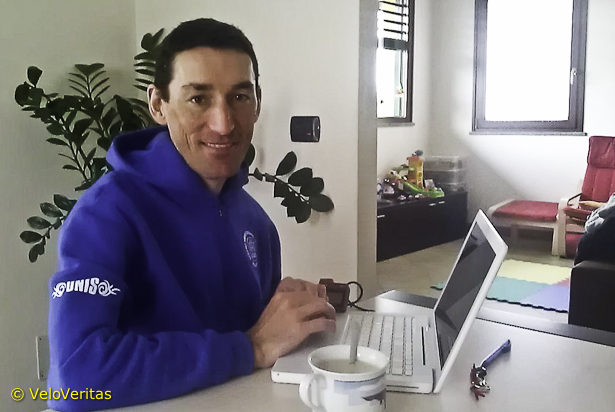“Entrepreneurs on the Saddle” is the first of several excerpts from my book “The Cycling Professor“, to give you a flavour of the topics I discuss in it. Thanks to the guys at VeloVeritas for the opportunity to do this.
In this extract, which is a short chapter about my idea that professionals cyclists are essentially entrepreneurs, with a product to market that is at once time-limited, unique and fragile – themselves.
I explain that despite being employed by a team, most riders have to organise their finances themselves – things that regular employees take a little for-granted such as health insurance, pension contributions and savings plans.
I hope you enjoy the chapter “Entrepreneurs on the Saddle“.

During the cycling season, it is officially forbidden to sign contracts with another team before September.
But already from the start of the Giro d’Italia, however, the first approaches between riders, or their agents, and team managers begin.
July, with the Tour de France in full swing, and August are the hottest months for the transfers.
No one wants to be without a team by September, when managers have by then sorted their budgets and the main resources have already been allotted.
The hottest topic during those weeks is therefore the renewals of contracts and movements in the various teams.
* * *
Seasonal contracts
In a world where the economic situation is certainly not one of expansion, professional cycling is going through a difficult period as well. Smaller entities find it harder to survive and for some riders it is not easy to find a place at a time when many teams are reducing their workforce.
Cycling is an incredibly precarious job, and it has been this way for long before the protests of other precarious workers filed the pages of newspapers (in Italy, precari are temporary contract workers).
In most cases, contracts have durations of one or two years.
Even the top names don’t have certainty of renewal; on the one hand the salary can double within a year in the face of good results, on the other, with a season below expectations, your salary can be downgraded at the drop of a hat.
For instance, let’s look at a typical Italian rider. With most of the Italian teams registered abroad, there is no obligation to comply with the law 91/1981 which regulates clubs: in this way no contributions to Enpals (the state pension) are paid to the rider and the rider himself cannot do so voluntarily except in special cases.
There is no redundancy fund and no social security. That has to be done by the individual through private pension schemes.
As a partial answer to these problems, the International Cycling Union (UCI) has established a Solidarity Fund, financed by a percentage of the prize funds from all races on the calendar, which ensures a rider who has been professional for at least five years, something in the region of €12,500 as a form of redundancy at the end of his career.

For those with less than five years service, and there are lots of them, they do not receive any severance pay.
In short, the profession is not very protected.
It used to be, at least in Italy, but, for the reasons mentioned earlier, many of the rights for which we fought in the past are now only nominal.
Guarantees protected by law are secured in times of economic expansion and in a completely different reality.
Now, many team are more competitive on costs, because they are facilitated by the legislation of their countries.
Either these countries adapt to the old system, which is very unlikely, or we all have to adapt to their new ways. The best solution would be a halfway point…
* * *
Entrepreneurial risks of a cyclist
A cyclist, before understanding if the bike can be a source of income, has to wait until he’s at least twenty-one, twenty-two, with the risk of not being able to become a professional by then, or even worse, to become one and after two or three years to be without a team.
The commitment that is required for training and adequate rest leaves little room for studying or to pursue other careers as an alternative.
In practice it’s like investing in a business (the rider is a true entrepreneur of himself) where the risks are not little. Among these risks, is the failure to launch the company (failing to become a pro), or having to stop in advance for inability or too much competition.
In any case, sooner or later all careers end, and when it happens, it’s time to think about life after cycling.
A percentage of riders remain in the racing scene, in technical roles (team manager, mechanic, masseur), others find employment with companies in the sector, building on the experience in the field. But many will have to start from scratch at an age when they have family and many responsibilities.
It would be wise to prepare for retirement by thinking about it in advance, but it is not something hat everyone can plan, because sometimes it is a choice imposed by others or somewhat “unexpected”.
An athlete on retirement, however, carries a baggage of skills (flexibility, autonomy, spirit of sacrifice, the same qualities that allowed him to become a professional in the first place) and experience that can be used to face challenges in other jobs.
Buy Marco’s book for your Kindle device or app on Amazon,
or why not treat yourself to the printed paperback version in Italian.



